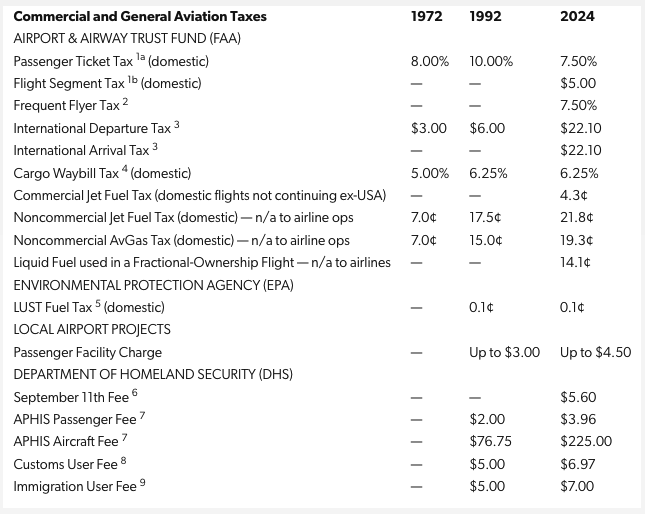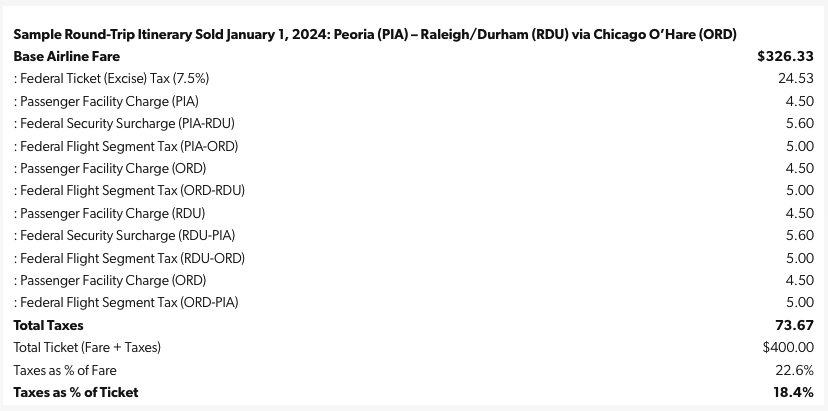If you’ve been paying attention to the news for the past few months, you’re aware that five of the six largest U.S. airlines have recently raised what they charge for checked bag fees. Alaska Airlines raised their fees in January. American and jetBlue raised theirs in February. United quickly followed, and Delta raised their fees in March.
Lots of people, unhappy with the fees, often say the same thing: “I wish they’d just raise the price of the ticket, instead of nickel and diming us for checked bags.” But there’s a specific reason why airlines started charging for checked bags back in 2008 (actually, smaller, discount carriers such as Allegiant and Spirit had been charging bag fees since 2007 or earlier), and it’s one they’re not going to give up any time soon.
It gives them a tax break.
Just as we have to pay taxes on things we buy and money we earn, so do airlines. Along with several other taxes and fees, airlines are required to pay the federal government 7.5% of the ticket price when flying passengers on domestic flights.
Nor surprisingly, just like real people, the airlines are against these fees. Not that they pay these taxes out of their own pockets; they’re passed on to each of us passengers. In fact, their trade association argue the point that these fees increase the cost to the consumer of a typical air ticket by around 20%. Here’s what airlines.org lists as these government-imposed taxes on air transportation:

And a sample round-trip ticket from PIA to RDU via ORD:

That being said, the U.S. Code of Federal Regulations specifically excludes baggage from that 7.5% transportation tax, as long as “the charge is separable from the payment for the transportation of a person and is shown in the exact amount.”
So if an airline charges a combined $400 to fly you and one bag on a round-trip domestic flight it owes the government $24.53 as that 7.5% Federal Ticket (Excise) Tax. But if the airline charges $320 to fly you, plus separately charges $40 each way for the bag (so $40 x2), then your total cost is the same – $400 – but the airline only owes the government 7.5% of $320, not of $400. So removing the charges specifically for your baggage saves the airline several dollars per passenger. Multiple that by hundreds of millions of passengers per year, and that’s a huge savings for the airlines (it’s estimated that when the full data is in for 2023, total bag fees will likely top $7 billion, which is about $9 for the average domestic passenger. By splitting out the cost of bags, airlines avoided paying about half a billion dollars in taxes in 2023 alone.
What about international flights?
The U.S. government doesn’t apply the 7.5% tax to international flights that go more than 225 miles beyond the nation’s borders. Instead, there are fixed international departure and arrival taxes. That’s why major airlines charge $35 to $40 for bags if you’re flying domestically, but don’t charge a bag fee when you’re flying to Europe or Asia.
What about other countries’ domestic flights?
Obviously, each country’s tax laws are different. Maybe there are other countries that have similar taxes to ours. Or maybe the other airlines, seeing that U.S. airlines can get away with charging $35 – $40 per bag, they figure they can get away with it, too. You know…because of the extra fuel costs. Or something.
Want to comment on this post? Great! Read this first to help ensure it gets approved.
Want to sponsor a post, write something for Your Mileage May Vary, or put ads on our site? Click here for more info.
Like this post? Please share it! We have plenty more just like it and would love it if you decided to hang around and sign up to get emailed notifications of when we post.
Whether you’ve read our articles before or this is the first time you’re stopping by, we’re really glad you’re here and hope you come back to visit again!
This post first appeared on Your Mileage May Vary
